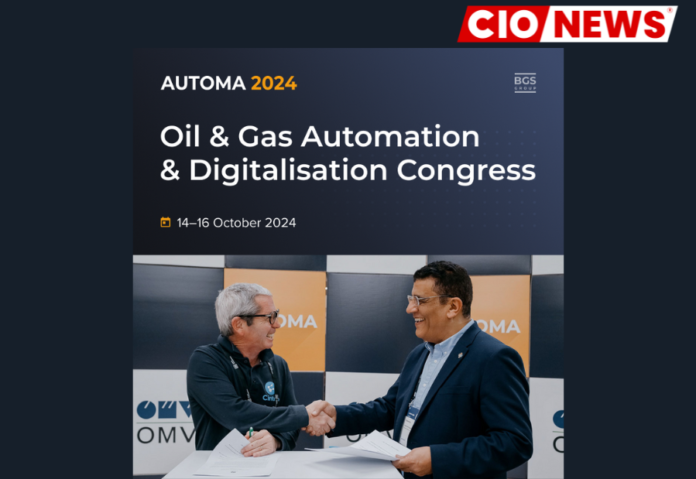This is an exclusive article series conducted by Santosh Vaswani, Journalist & Editor at CIO News with BGS Group.
In the world where digital transformation is reshaping the market, the oil and gas sector is no exception, with automation technologies continuing to drive significant changes. Over the next five years, automation is poised to revolutionize operations, leading to unprecedented levels of efficiency, safety, and profitability. As the industry navigates these rapid advancements, events like the Oil & Gas Automation and Digitalization Congress (AUTOMA) have become crucial for exploring the latest innovations and sharing expertise. During AUTOMA, experts discuss how the integration of such technologies as digital twins, robotic process automation (RPA), and cloud computing plays a key role in this transformation.
A significant development in automation is the use of digital twins, a technology that creates a virtual model of a physical asset or process. During the previous edition of AUTOMA sessions, Bernhard Geissler, Senior Expert in Digital Refining Processes at OMV Downstream GmbH, elaborated on how digital twins can optimize operations and improve efficiency in the oil and gas sector.
These virtual models enable real-time monitoring and predictive maintenance, but integrating digital twins into existing systems presents challenges. Geissler highlighted these issues with an example from OMV’s Schwechat refinery, where the technology was used to optimize the power plant’s operations. The project involved collecting and processing data from various sources, including emails, databases, and internet feeds, across different operational levels. The complexity of this task highlights the need for a robust technological stack that combines both modern and traditional tools to ensure seamless data transfer and processing. The speaker highlighted that successful implementation of digital twins requires overcoming complex technical and operational hurdles.
In his speech, Geissler also touched on the growing trend of cloud-based solutions, or “cloudification,” which is shaping the future of the oil and gas industry. The adoption of cloud technologies provides greater scalability, mobility, and accessibility, which are essential for modernizing and optimizing operations. However, as the speaker noted, this transition comes with its own set of challenges, particularly in terms of IT and OT security. The industry often relies on hybrid platforms that combine legacy systems with modern cloud technologies, including AI, IoT, and machine learning.
Successful integration of these technologies requires careful consideration of existing infrastructure and challenges posed by the oil and gas sector. Despite these challenges, the benefits of cloudification, such as real-time data processing and improved decision-making capabilities, are too important to ignore.
Another technology poised to transform the industry is Robotic Process Automation (RPA). During the discussion on digital tools for asset integrity management at the AUTOMA Congress, Florian Winkler and Norbert Prügl presented a detailed overview of how RPA can be effectively implemented in OMV Downstream GmbH.
Speakers highlighted that one of the key benefits of RPA is its ability to handle one-time actions that might not seem worth automating at first. By automating such tasks, companies can realize time savings and improve accuracy in areas that are often overlooked. They also discussed the importance of identifying suitable projects for RPA by collaborating closely with business colleagues from the initial idea to the final implementation.
As automation technologies continue to evolve, the oil and gas industry is set to undergo a profound transformation. The integration of digital twins, RPA, and cloud computing enables companies to optimize operations, reduce costs, and improve safety. However, the path to full automation is not without its challenges. As demonstrated by the example of OMV Downstream GmbH, the successful adoption of these technologies requires a strategic approach that combines innovation with a deep understanding of the industry’s complexities.
The upcoming AUTOMA 2024 Congress offers a unique opportunity to delve deeper into the latest advancements in automation and digitalization technologies. Delegates have the chance to hear from industry leaders, participate in workshops, and learn about cutting-edge technologies that are transforming the oil and gas industry.
Also read: Unveiling the Ethical Imperatives: Navigating the Intersection of AI and Cybersecurity
Do Follow: CIO News LinkedIn Account | CIO News Facebook | CIO News Youtube | CIO News Twitter
About us:
CIO News is the premier platform dedicated to delivering the latest news, updates, and insights from the CIO industry. As a trusted source in the technology and IT sector, we provide a comprehensive resource for executives and professionals seeking to stay informed and ahead of the curve. With a focus on cutting-edge developments and trends, CIO News serves as your go-to destination for staying abreast of the rapidly evolving landscape of technology and IT. Founded in June 2020, CIO News has rapidly evolved with ambitious growth plans to expand globally, targeting markets in the Middle East & Africa, ASEAN, USA, and the UK.
CIO News is a proprietary of Mercadeo Multiventures Pvt Ltd.






